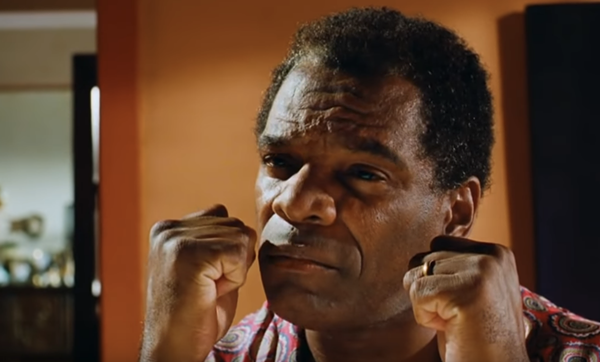The mere onscreen presence of John Witherspoon guaranteed at least a few moments of genuine pleasure. No matter how bad the film, he could be counted on to steal the spotlight with lines that were as quotable as they were unprintable. He was often over the top, which served him well in the comedies he appeared in, but there was no denying his comic timing or his utter shamelessness. He was like that uncle of yours, the one obsessed with absurd conspiracy theories, or the authority figure whose righteousness hid the fact that he might need some authority over him. He was instantly recognizable as these figures, especially if you were Black; if Jenifer Lewis can lay claim to playing everybody’s Black Mama onscreen, Witherspoon can own the title of our collective Black Pops. So, it’s with sadness that I report a death in the family. Witherspoon left us this week. He was 77.
Witherspoon started his career as a model in the 1960s, but his greatest asset was his voice. To me, there was always a tinge of Southern farm country to it, even though he was from Detroit. That voice, and its uncanny knack for delivering a punchline, served him very well as a stand-up comedian. His comedy club appearances found him rubbing shoulders with Richard Pryor and David Letterman, the latter of whom is the godfather of Witherspoon’s children. His stand-up work in the 1970s may have led to his being cast in his movie debut as the MC of the Black club where Neil Diamond performed in blackface in the hideous disaster that is 1980s remake of “The Jazz Singer.” After that, there was no place to go but up.
Over time, Witherspoon worked with an impressive array of fellow comedians, each of whom sought his particular brand of lecture-filled comedy. He worked with Robin Williams and Richard Pryor on Pryor’s short-lived NBC sketch show. He played an uncle on Martin Lawrence’s sitcom, “Martin.” He appeared multiple times with Robert Townsend and Eddie Murphy. And in his biggest live-action television role, he was the father of Shawn and Marlon Wayans on “The Wayans Bros.” That show lasted an unbelievable 101 episodes, each of which he managed to steal despite the elastic antics of the titular leads.
Ice Cube’s “Friday” series of stoner comedies may be what Witherspoon is best remembered for, but by the time that film hit theaters, he had already accumulated several unforgettable moments on the big screen. In Townsend’s brilliant shellacking of Black cinematic stereotypes, 1987’s “Hollywood Shuffle,” Witherspoon played Mr. Jones, Bossman to Townsend and another Wayans brother, Keenan Ivory. He was the enterprising owner of “Winky Dinky Dog,” the bootleg hotdog outlet that employed wannabe actor Bobby Taylor. Wearing a paper fast-food restaurant hat with plastic hot dogs sticking out of it, Witherspoon lectured his employees on work ethics and entrepreneurial ingenuity. Strutting about like a proud peacock, he claimed ownership of every item on the Winky Dinky Dog menu. “And I got a new one, Bobby,” he says excitedly. “Winky Dinky Ho Cakes! Ho cakes! Hos got to eat too!”
Keeping with that tie to the ubiquitous Wayans, Witherspoon played the Pops of “In Living Color”’s David Alan Grier in the 1992 Eddie Murphy romantic comedy, “Boomerang.” For me, this is Witherspoon’s funniest role. Grier’s character is mortified by his parents’ behavior, and who wouldn’t be? They bring an enormous pot of chitlins to a dinner party, get bizzy in the bathroom and Witherspoon loudly smacks his lips as he’s eating, something he would become notorious for doing. “Boomerang” was where Witherspoon got one of his nicknames, “Mr. Bang Bang Bang,” for reasons too filthy for me to divulge here. This role also earned him his signature phrase. When Murphy is checking out his attire, Witherspoon shows just how committed he is to the mushroom motif that adorns each article of clothing. “You gotsta co-ordinate!” he advises.
Most recently, Witherspoon appeared as the voice of Grandpa Freeman on “The Boondocks,” which re-teamed him with Reginald Hudlin, the director who gave him a role in ’90s Kid ‘n Play comedy “House Party.” Taking advantage of his ability to hilariously use malapropisms, “House Party” has him refer to rap group Public Enemy as “Public Enema.” “Who the hell wants a public enema?” he argues in the grumpy voice he’ll use for Huey and Riley’s guardian. Grandpa Freeman is perhaps Witherspoon’s most complex role; in addition to being a tough disciplinarian, he has to deal with racist, self-hating Uncle Ruckus and milquetoast Buppie lawyer, Tom. Grandpa also has his own desires—hormonal and monetary—that he must contend with while maintaining his role as the show’s official voice of wisdom and authority. Only the voice of Witherspoon could convince us that Lionel Richie’s ex-wife, Brenda fought in the Kumite, the same event Jean-Claude van Damme won in “Bloodsport.”
In a way, Witherspoon reminded me of Dick Miller and M. Emmet Walsh, actors who made me happy just by showing up. They may not be the center of the plot, but they commandeer it whenever they appear. And people remember them, even if they don’t remember their names. Though he rarely played the lead, Witherspoon elevated everything in which he appeared. Except maybe “The Jazz Singer”—nothing could save that. I hope wherever he is, he’s coordinating. Rest in peace, Spoon.












